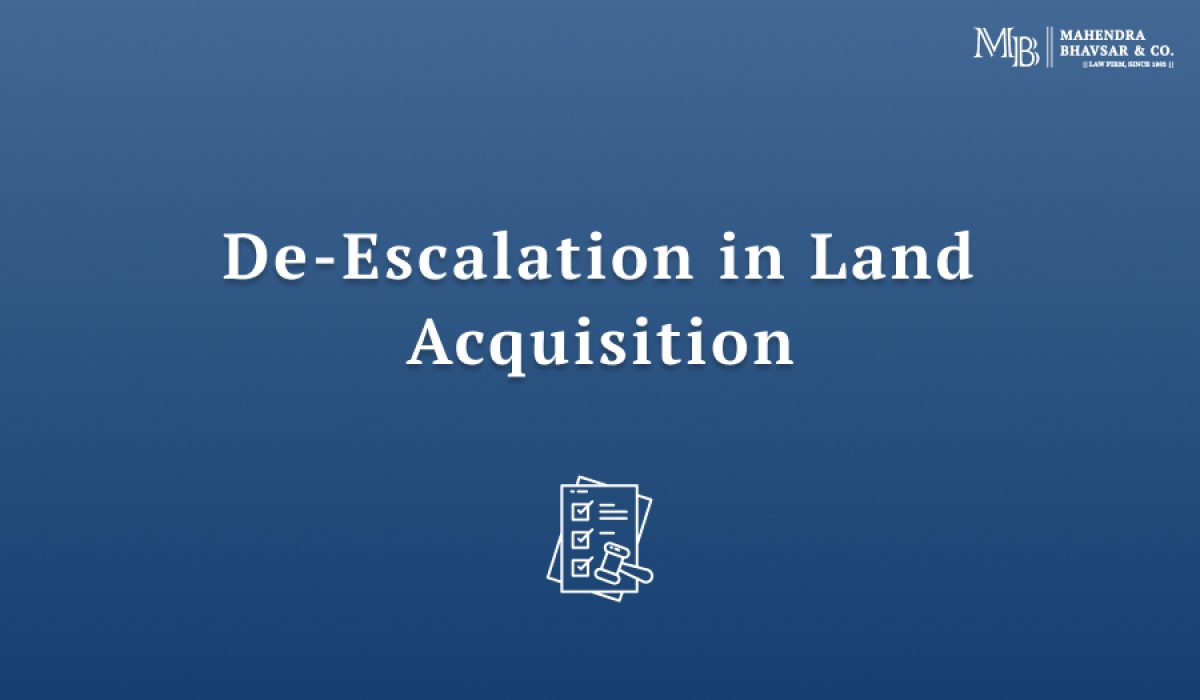I. Introduction
In a significant land acquisition ruling, the Supreme Court in Union of India & Anr. v. Harakchand Misirimal Solanki, Civil Appeal No. 5688 of 2010, decided on April 2, 2024, has authoritatively interpreted the principle of “de-escalation” in computing compensation under the Land Acquisition Act, 1894. The Court ruled that the highest bona fide sale exemplar must be considered for computing market value unless there is compelling evidence of outliers or exaggeration.
This judgment offers clarity on the often-contested methodology for land valuation, affirming consistency in applying exemplars and discouraging arbitrary deductions by authorities.
II. Factual Background
The case emerged from a notification under Section 4(1) of the Land Acquisition Act issued in 1993 for acquisition of lands in Nashik District, Maharashtra, for a public purpose. The Land Acquisition Officer awarded a compensation of ₹40,000 per hectare.
Dissatisfied landowners approached the Reference Court, which enhanced the compensation to ₹1,20,000 per hectare. The High Court, based on exemplar sale deeds, further enhanced it to ₹1,80,000 per hectare.
Union of India challenged the High Court’s judgment before the Supreme Court, arguing that the High Court had erroneously adopted a sale deed that did not reflect the correct market value.
III. Issues for Consideration
- Whether the High Court was correct in taking the highest exemplar sale deed for determining market value?
- Whether the principle of “de-escalation” permits the rejection of highest bona fide sale transactions?
- Whether deductions were required to be made for development and amenities?
IV. Arguments Advanced
Appellant (Union of India):
- Asserted that the High Court had erred in relying on a sale deed with a small plot size and inflated price.
- Argued for the application of average sale prices or a lower, more “representative” exemplar.
- Contended that deductions ought to have been made for development costs as the acquired land was undeveloped.
Respondent (Claimants):
- Defended the High Court’s reliance on a bona fide and proximate exemplar sale deed.
- Emphasized that the land acquired was abutting a National Highway and was ripe for development.
- Argued that development deductions were not applicable in such context.
V. Court’s Reasoning and Observations
The Supreme Court upheld the High Court’s reliance on the highest bona fide exemplar, rejecting the appellant’s argument for adopting average or de-escalated rates.
Key observations:
- Preferential Treatment of Highest Bona Fide Sale Exemplar:
The Court reiterated that where multiple sale instances are available, the highest bona fide exemplar should be taken as the basis, unless it is shown to be an outlier, manipulated, or speculative. This is supported by prior rulings in:- Union of India v. Mangatu Ram, (1997) 6 SCC 59
- Sabhia Mohammed Yusuf Abdul Hamid Mulla v. Land Acquisition Officer, (2012) 7 SCC 595
- Union of India v. Mangatu Ram, (1997) 6 SCC 59
- No Arbitrary De-escalation Permissible:
The bench cautioned that courts must not indulge in speculative deductions or downward corrections without cogent material on record. The principle of “de-escalation” does not imply reducing compensation merely due to departmental apprehensions. - Size of Plot Not Sole Determinant:
Merely because the exemplar sale deed relates to a smaller plot, it cannot be discarded outright, especially when the land acquired is similarly situated or part of an integrated development corridor. - Development Deductions Not Automatic:
Unless the land is in an early stage of urban expansion, blanket deductions for roads and amenities cannot be made. If land is already developed or has direct road access, no substantial deductions are justified.
VI. Conclusion
The Supreme Court’s decision in Harakchand Misirimal Solanki serves as a clarion precedent against arbitrary valuation practices in land acquisition matters. By emphasizing the primacy of bona fide high-value exemplars, the Court has preserved landowners’ rights to fair compensation.
It affirms the legal position that while de-escalation can be a useful tool in valuation, it cannot override objective indicators of market trends. Additionally, deductions must be evidence-based, not routine.
This judgment will be a guiding light for future reference courts, tribunals, and High Courts in standardizing compensation methodology, ensuring that justice in land acquisition is both fair and uniform.
FAQs:
Q1. What is meant by a ‘bona fide sale exemplar?
A bona fide sale exemplar is a genuine, arm’s-length sale transaction of similar land that reflects the prevailing market value. Courts often use such transactions to assess fair compensation.
Q2. Can authorities disregard the highest exemplar if it’s for a smaller plot?
No. The Supreme Court held that a smaller plot size alone is not a valid reason to reject a genuine sale transaction if the location and circumstances are comparable to the acquired land.
Q3. What is the Court’s position on “de-escalation” of compensation?
The Court ruled that arbitrary or speculative “de-escalation” of compensation is impermissible. Any downward adjustment must be supported by strong, objective evidence.
Q4. Are development deductions mandatory when valuing land?
No. Deductions for development (like roads and amenities) are not automatic. They apply only when the land is undeveloped or in early stages of urbanization. If land is already developed or road-facing, no such deductions are justified.
Stay informed with insights that matter. Follow us for more updates on key legal developments.
Disclaimer
The content provided here is for general information only; it does not constitute legal advice. Reading them does not create a lawyer-client relationship, and Mahendra Bhavsar & Co. disclaims all liability for actions taken or omitted based on this content. Always obtain advice from qualified counsel for your specific circumstances. © Mahendra Bhavsar & Co.
